October 18, 2025 – Jungto Dharma School Q&A, Unification Sports Festival, Medical Professionals Q&A
Hello. Today, Sunim planned to meet with Jungto Dharma School students in the morning, North Korean defectors in the afternoon, and healthcare professionals in the evening.
After completing his early morning practice and meditation, Sunim held an online Dharma Q&A session with Jungto Dharma School students from the broadcasting room at Seoul Jungto Center starting at 10 AM.
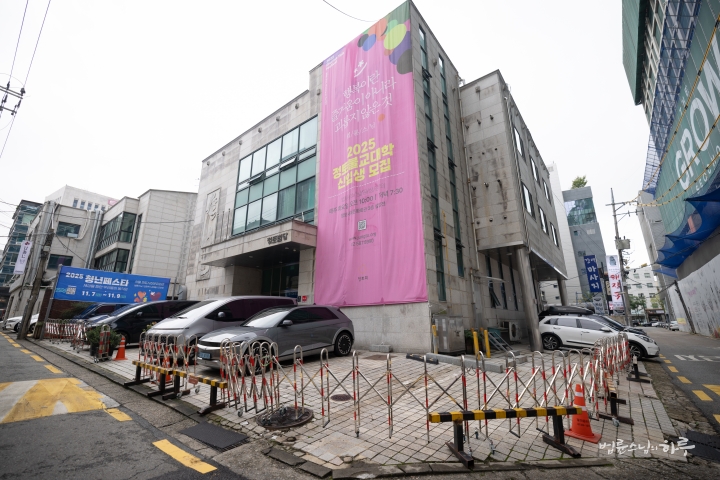
The students had enrolled in September and had completed one session of the Practical Buddhist Thought curriculum and mindful sharing practice, so they hadn’t learned that much yet. Nevertheless, this session was arranged to review what they had learned and address their questions.
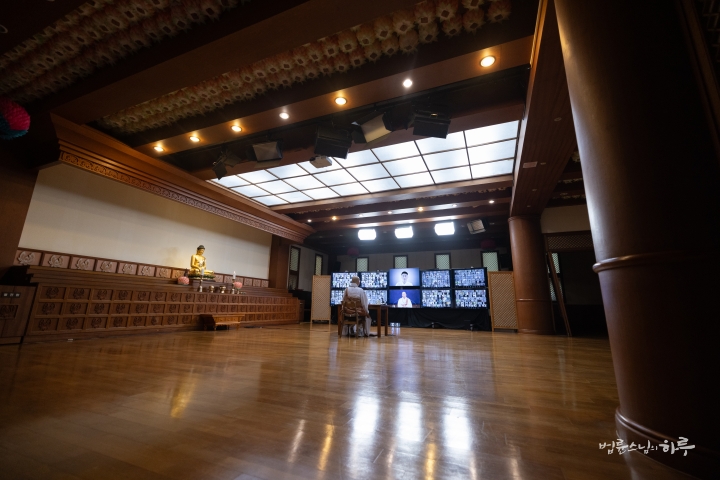
When Sunim took his seat in front of the camera, they recited the Three Refuges and Words for Practice before beginning the Dharma Q&A. After listening to the students’ reflections, everyone requested a Dharma talk from Sunim with three prostrations. Sunim began with a warm greeting.
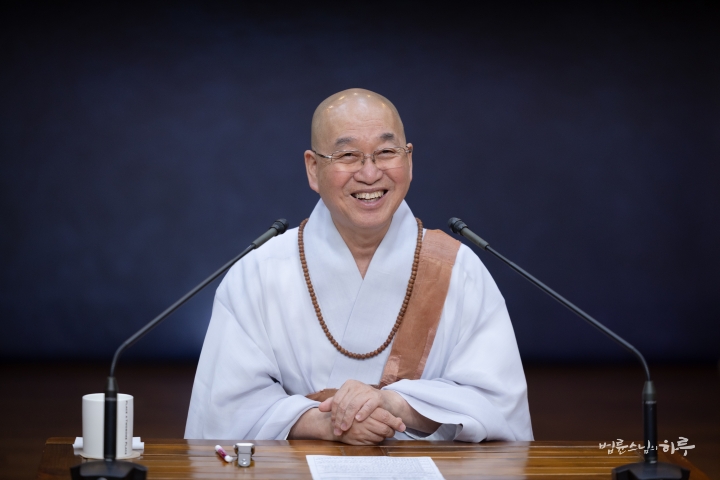
“It hasn’t even been a month since you enrolled. Plus, with the Chuseok holiday, you’ve probably had about three classes. It might be a bit early to ask questions about doubts from your studies. But even after one day of study, questions can arise, so let’s hear what you have to say.”
Although they had just started classes, there were many questions. During the two-hour session, eight people raised their hands to ask Sunim questions. One person shared their struggle with feeling tense and anxious whenever standing in front of people, unable to share comfortably.
Why Do I Feel So Anxious When Speaking in Front of People, Even Though I Want to Speak Comfortably?
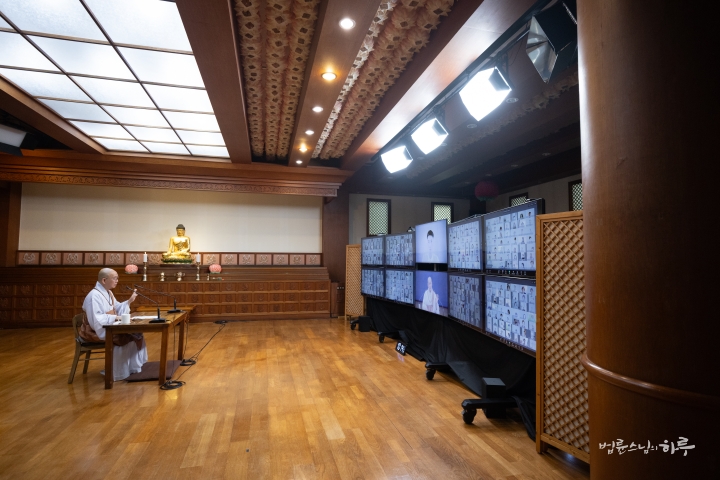
“When we practice ‘sharing,’ there are two types: ‘reflection sharing’ and ‘mindful sharing.’ While they may seem similar, their nature is quite different. Mindful sharing means recognizing and expressing the state of your mind at this very moment, just as it is. If you’re angry right now, you simply say, ‘I’m angry.’ Mindful sharing is short and simple like this. When sentences become long, it’s already thought sharing, not mindful sharing.
For example, in your case, mindful sharing could be: ‘Right now, I feel anxious,’ ‘Right now, I feel uneasy,’ ‘Right now, I feel frustrated.’ Then you can add just one sentence explaining why.
‘Because I keep worrying about what to say.’ ‘Because I’m attached to wanting to speak well.’ ‘Because thoughts of wanting to look good keep arising.’ ‘I feel frustrated because I don’t understand what Sunim is saying.’
You don’t need to write down or prepare your state of mind in advance. The moment you think, ‘What should I say?’ you’re already doing thought sharing. True mindful sharing is simply recognizing and expressing your mind as it is in this very moment.
‘Right now, I feel refreshed because I understood Sunim’s explanation.’ ‘Right now, I feel happy because I got what I wanted.’
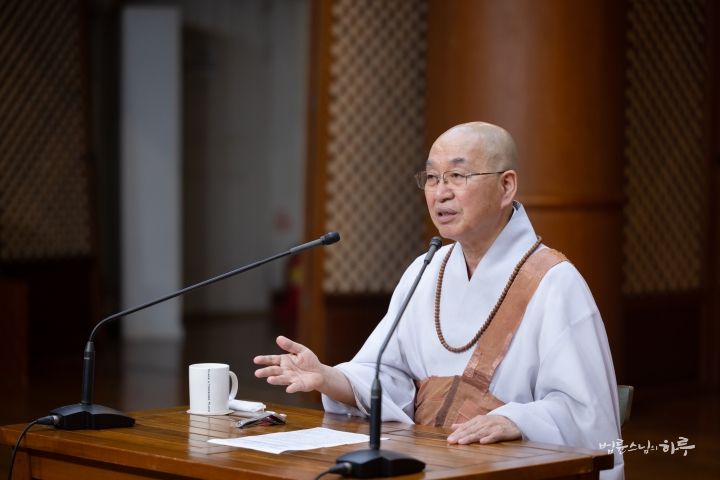
This is how you express your feelings at this very moment, just as they are. Not yesterday’s feelings, not someone else’s feelings. Only your feelings at this very moment, along with a brief explanation of why they arose. In other words, one sentence saying ‘I feel this way’ and one or two sentences explaining ‘The reason is this’ are sufficient. That’s why mindful sharing doesn’t exceed three sentences. If your words become lengthy, you’re no longer sharing your feelings but your thoughts. Mindful sharing is not inherently difficult. It’s enough to simply say, ‘I feel frustrated right now. I’m not sure why.’ Honestly revealing what you’re feeling right now—that’s what mindful sharing is.
On the other hand, sharing reflections involves adding your thoughts to your feelings. When you were just talking about your experience attending Jungto Dharma School, your words became a bit lengthy, didn’t they? That’s because you were sharing your ‘thoughts.’ Sharing reflections isn’t about expressing your current state of mind, but rather recounting past experiences or thoughts from that time. For example, talking about how you came to attend Jungto Dharma School or what help you received through Dharma Q&A. In other words, reflections include not only expressions of current feelings like ‘I feel nervous right now,’ but also your thoughts and interpretations about how those feelings arose. If ten people share reflections for 20 minutes, each person would speak for an average of about 2 minutes. Even if some speak longer and others shorter, it should be at most 3 minutes and at least 1 minute. Saying ‘I have no reflections’ actually means you don’t want to speak. For reflections, it’s sufficient to briefly share your thoughts or feelings as they come to mind.
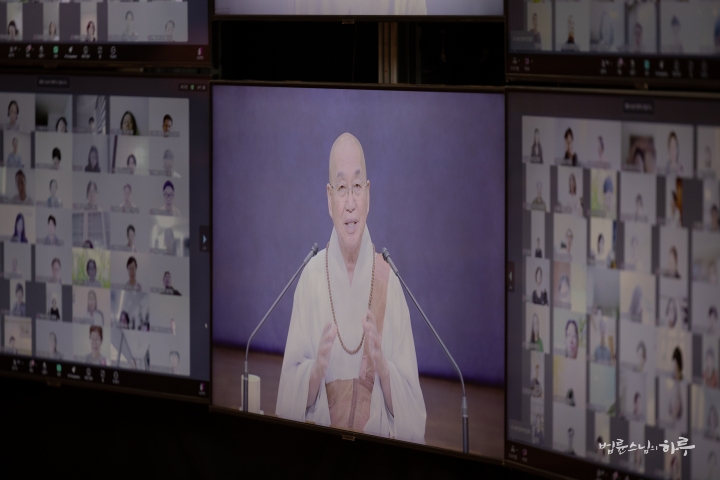
However, when speaking in front of others, the pressure to “do well” arises, and this thought undermines confidence, making it even harder to open one’s mouth. In fact, attending Jungto Dharma School isn’t difficult—what’s most challenging is “sharing reflections” and “mindful sharing.” These two activities sometimes make people hesitate to continue their studies. They think, “Why do we have to share when we could just listen quietly and leave?” But after attending Jungto Society for a while, people come to understand that the highlight of Jungto Dharma School is precisely these sharing sessions. While listening to Sunim’s Dharma talks is valuable, genuine connection happens during the time of sharing hearts with one another. Dharma talks involve one-way listening, but mindful sharing is a time of mutual exchange between hearts. Yet in daily life, people rarely share their hearts. Many live in isolation. The deeply ingrained thought of “always having to do well” makes forming relationships awkward and causes people to withdraw. That’s why Jungto Dharma School deliberately includes frequent sharing sessions.
After some time, changes occur. Initially, words are brief and awkward, but by graduation, people have so much to say. They clamor, “Please give us more time.” Right now, the allotted time might seem like too much. But wait just two months. Requests will follow: “Why is the time limited to exactly 70 minutes? It would be better if it were longer.” The same happens with the India pilgrimage. Those who initially say “16 days is too long” return saying, “It would have been nice if it were a bit longer.” When genuine connection begins, that time always feels too short.
“I was happy listening to the sutra lectures. Passages I couldn’t understand before now make sense.” “I felt frustrated listening to the sutra lectures. I still don’t quite understand what they mean.”
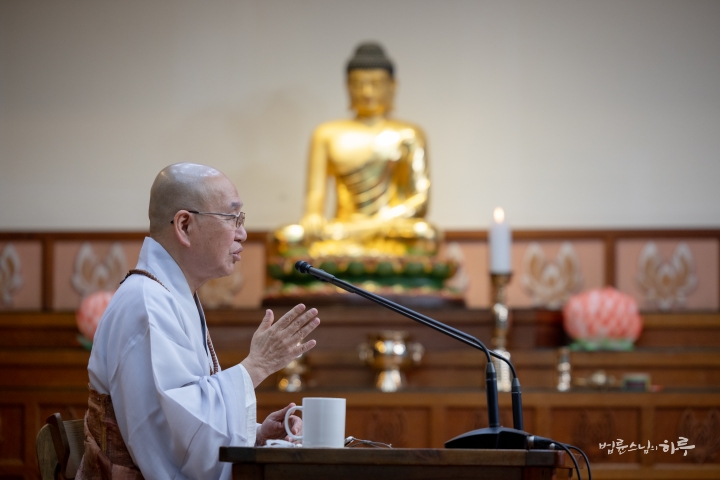
This is how you can say it. It’s not difficult at all. Mindful sharing is brief. It shouldn’t exceed 30 seconds at most. Adding a little of your own experience or what you want to say is sufficient. If you practice consistently like this, you can naturally break free from the habit of preparing notes in advance when talking with people.
Of course, in formal settings like academic presentations or case studies, simple notes are necessary. That’s because it involves sharing thoughts. It’s fine to organize an outline to avoid forgetting or to write down and read the entire content in advance. You might miss something while speaking, or feel regretful afterward thinking, ‘I forgot to mention that.’
“I get very nervous when talking with people at work or speaking in front of larger groups, making it difficult to feel comfortable. I’m curious about how I can let go of this anxiety and speak more comfortably.”
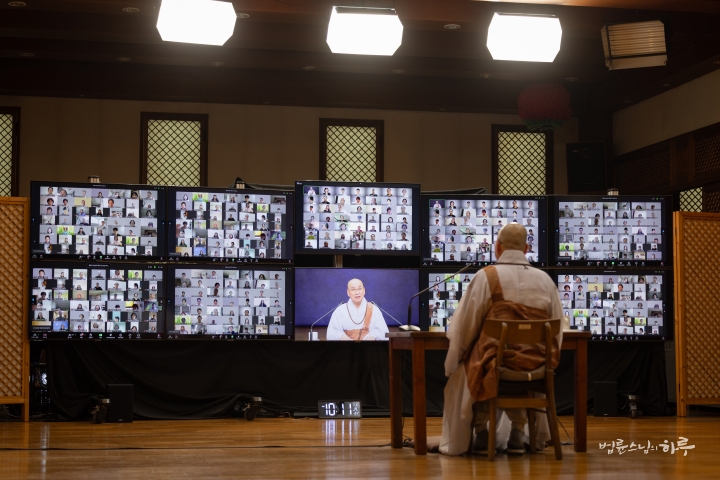
“When you feel nervous standing in front of people, just say, ‘I’m feeling nervous right now.’ It becomes harder when you try to hide that feeling. Just be honest and say, ‘I feel nervous standing in front of many people. I may be lacking, but please listen well,’ or ‘I’m not a good speaker. It may be disorganized, but let me try to share.’ Start by saying this. You feel nervous because you’re trying to do well. Of course, some presentations require preparation, but you don’t need to memorize everything. Especially in sharing impressions or mindful sharing, you don’t even need notes. It’s sufficient to simply express your current state of mind as it is.
To become comfortable, you need repeated practice. Even uncomfortable things become natural when you do them several times. That’s why people who hesitate to present should present more often. After doing it once or twice, you’ll quickly get used to it.
It’s the same with singing. When someone says, ‘Try singing,’ people respond, ‘I can’t sing well.’ But actually, that doesn’t mean ‘I can’t do it’ but rather ‘I can’t do it well.’ They asked you to ‘sing,’ not to ‘sing well.’ You can just sing a nursery rhyme; for example, ‘The School Bell Goes Ding-Dong-Dang’ or ‘Mountain Rabbit,’ any song will do. But we get caught up in the obsession of ‘having to do well’ and back away saying, ‘I can’t sing.’ Everyone knows you’re not a professional singer. So it doesn’t matter if you can’t sing well. You’re just comparing yourself to singers and feeling intimidated. So keep practicing speaking in front of people. The more you do it, the more comfortable you’ll become. People who speak too long in front of others should practice speaking briefly, and those who always step forward should practice listening rather than speaking.”
“Actually, I’m a bit nervous sharing my thoughts right now too. But what resonated most with me from Sunim’s words was ‘I told you to do it, not to do it well.’ I’ve been doing the same job for over 15 years at work, and I often speak in front of people or host events. Since I do it at least once a month, I thought I should be good at it by now, but I still get nervous. What I need to remember today is that I was tense because I was trying too hard to do well. I felt embarrassed that while others speak fluently, I speak while holding prepared notes. But after listening to Sunim, I realized that this is okay too. Thank you.”
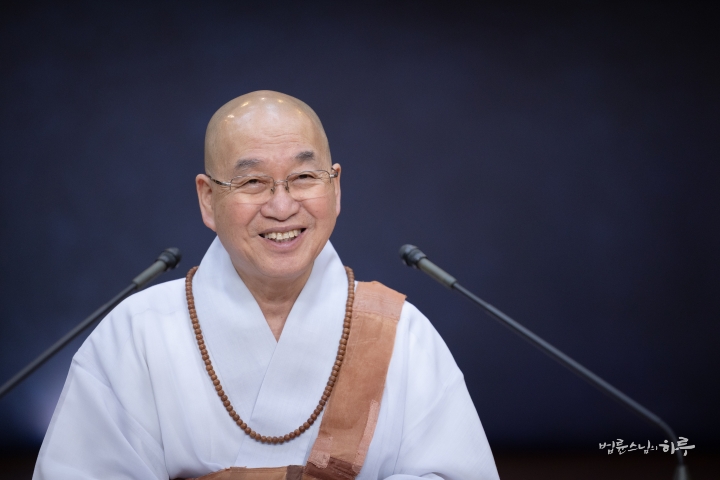
“From now on, try doing it without notes. Even if you make a mistake while speaking, just say naturally, ‘Sorry, I’m a bit slow.’ Don’t try to be too perfect, and it’s fine to use notes when necessary. There’s no problem with occasionally looking at notes while speaking. You don’t need to feel embarrassed about it. Even a country’s president actually reads from a script when giving speeches on TV.”
Questions continued to flow.
If I let go of the thought that ‘I am right,’ won’t I become someone without principles? Won’t I end up rationalizing the person who did something wrong?
When I spend holidays or long vacations alone, I feel very lonely. What mindset do I need to not feel distressed when alone?
If I reach a state without suffering, won’t life become bland? Isn’t a life with joy, anger, sorrow, and pleasure more human?
When I recognize my anger and choose not to express it, is that different from suppressing anger?
When I feel distressed by someone else’s obsession or coercion, is it enough to just manage my own mind? How should I respond wisely?
After receiving more questions, the dialogue ended at 12 o’clock. Students gathered in groups to continue their mindful sharing.
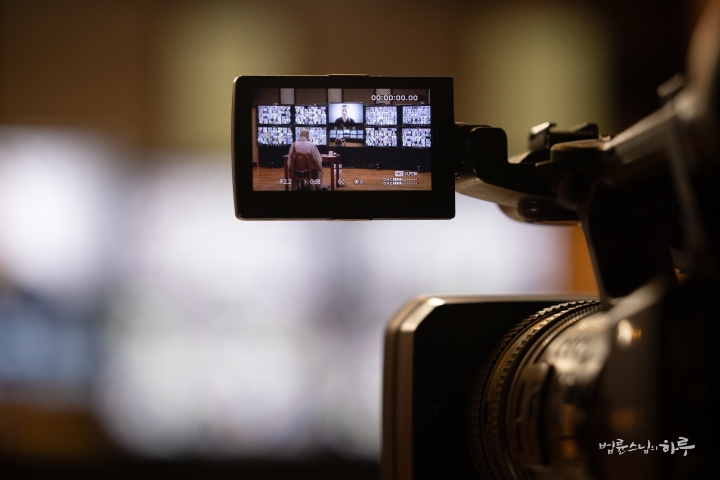
After lunch, at 2 PM, Sunim participated online in the Unification Festival with North Korean defectors. As he took his seat in front of the broadcasting room camera, the host wearing a hanbok, traditional Korean dress, gave opening remarks.
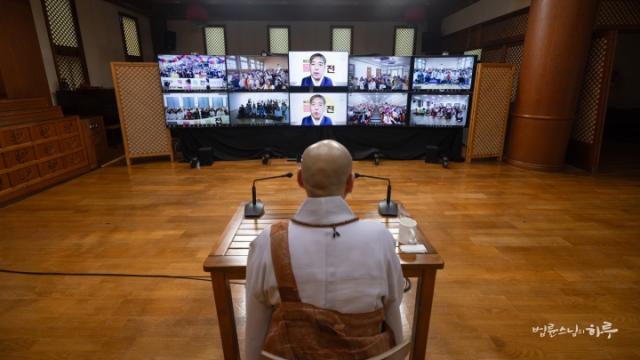
“Hello to all our compatriots across the country! We will now begin the 22nd Unification Festival of 2025.”
The Unification Festival is being held as a hybrid event, combining online and offline participation to keep pace with the times. Today, about 900 people gathered at eight regional locations to participate. Additionally, about 400 people participated online, making a total of approximately 1,300 participants who shared time together to reflect on their aspirations for peace and unification.
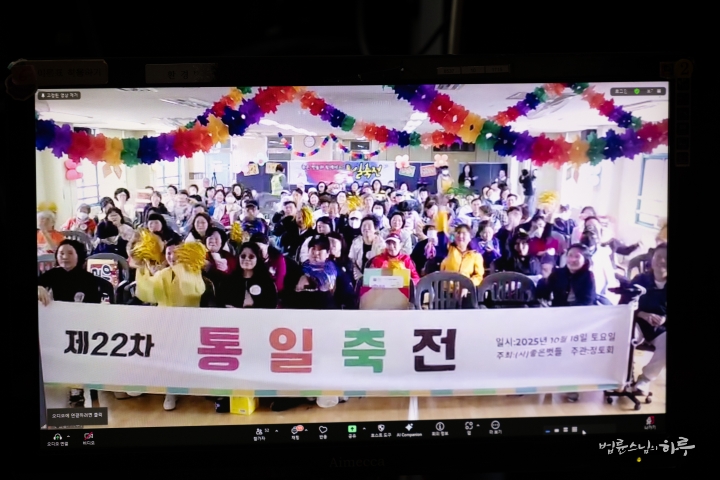
First, Sunim offered words of encouragement for the North Korean defectors.
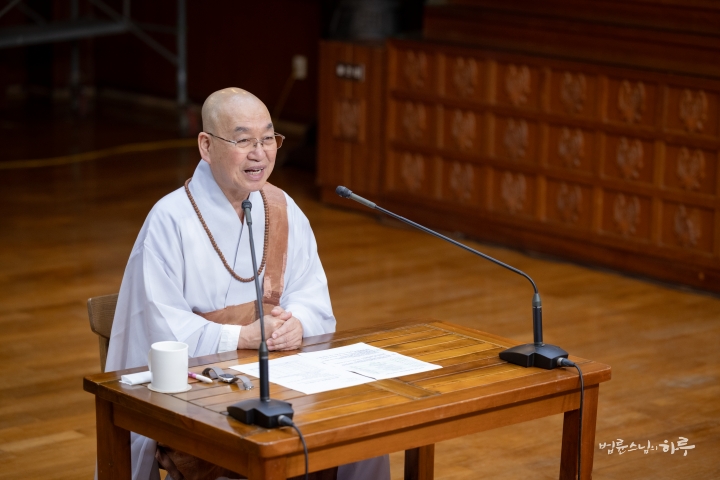
“Until last year, tensions were so high that there was talk of possible war between North and South Korea. However, with President Trump’s election in the United States and a new government in South Korea, the risk of war has somewhat diminished. Nevertheless, tensions between North and South Korea have not been completely resolved. While many people are hoping for a ‘surprise meeting’ between the top leaders of North Korea and the United States during this APEC summit, no one yet knows what will actually happen. Earlier this month, I visited Washington D.C. and heard both the American position and the North Korean atmosphere. Both sides seem willing to engage in dialogue, but they don’t appear to have reached the stage of concrete preparations yet. If the leaders of North Korea and the United States meet and begin dialogue, there’s a possibility that North-South dialogue could follow in that flow. However, it seems unlikely that North-South dialogue will occur within this year. Nevertheless, I hope that channels for such dialogue will open soon, that tensions on the Korean Peninsula will ease even a little, and that the day will come soon when you can contact your families in North Korea more freely and easily.
While Tensions Between North and South Remain, Channels for Dialogue Are Opening
Last week, I visited Dandong, China, and looked directly at Sinuiju across the Yalu River. These days in North Korea, tall buildings are being constructed everywhere at a rapid pace. Active construction is underway not only in Pyongyang but also in various cities near the border. However, at the same time, we continue to hear the sad news that North Korean residents still face difficulties even in making a living. During this Chuseok holiday, you must have felt an emptiness in your hearts, missing the hometowns you left behind. If North and South resume dialogue and allow travel, I believe the day when you can visit your hometowns again is not far off. Although unification may seem distant now, the day will surely come when you can meet your beloved families and hometowns again.”
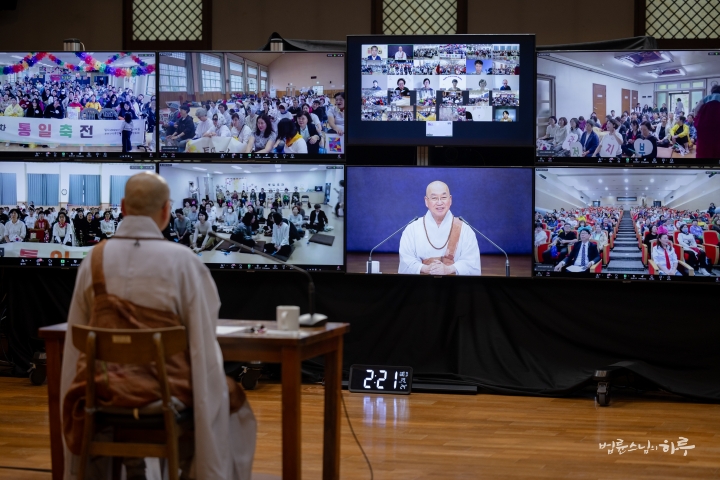
Next, there was time for regional introductions. Starting with the Gwangju-Jeolla branch, they energetically shouted their pre-practiced slogans.
“We had a fun and exciting sports day this morning divided into four teams. With that energy, we’d like to greet you. Peace!! Unification!! Harmony!! Hope!!”
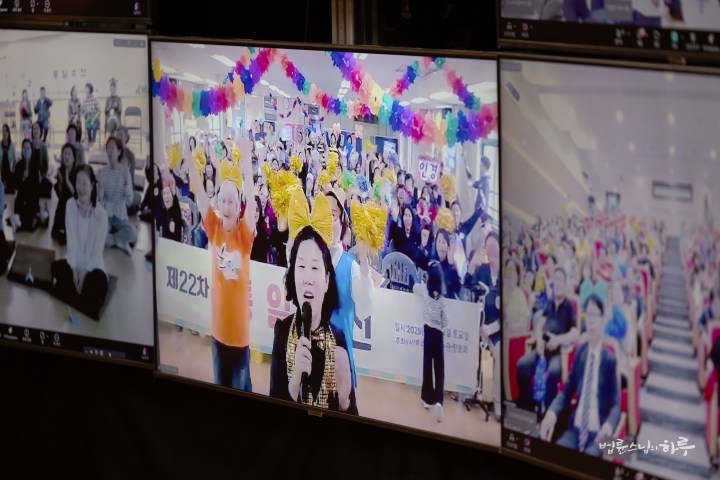
After the regional introductions, the talent show began in earnest. Various performances from each region followed, including music, dance, poetry recitation, and instrumental performances, delivering warm emotions and laughter.
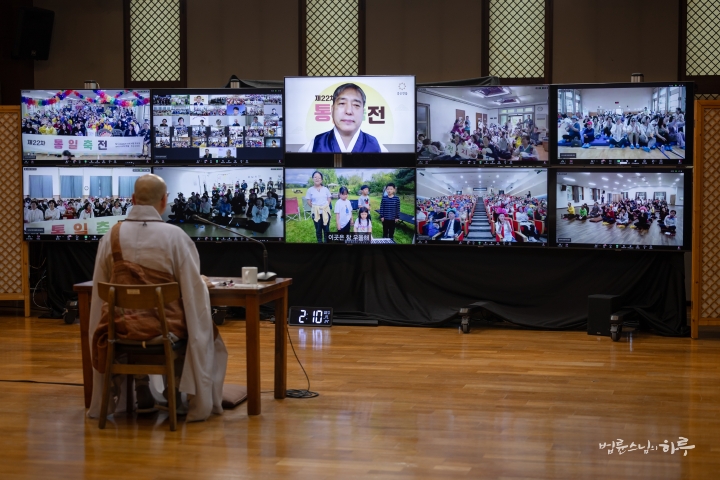
There was someone who sang “Flower Road” with hope while reflecting on life’s difficulties, someone who calmly sang “First Love,” a children’s choir that presented a bright and cheerful stage singing “I Am an Octopus” with cute choreography, someone who recited an original poem honoring those who were sacrificed for crossing the Tumen River, and someone who expressed the longing and loneliness of North Korean defectors through a flute performance of “Thousand-Year Crane.” Performances from each region continued.
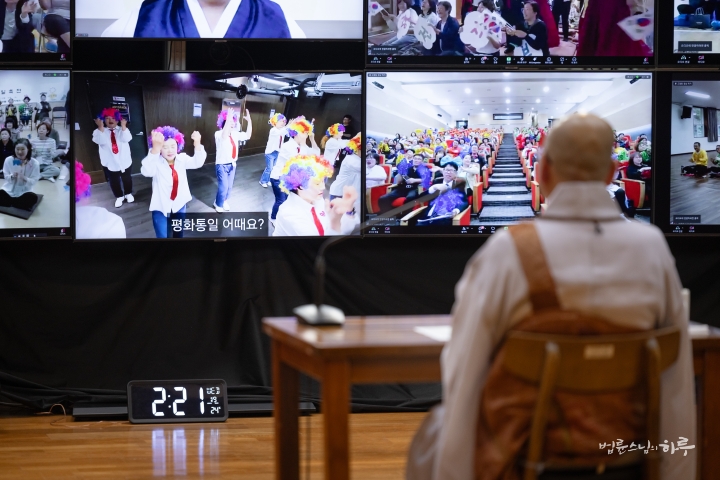
In particular, the Hwaseong region’s Tongsta team presented an exciting stage under the slogan “After chorus, now it’s dance!” They performed hopeful choreography to the song “Let’s Unify,” a parody of “Let’s Have a Drink,” expressing their spirit of not losing laughter despite difficulties.
As the excitement of the talent show grew hotter, there was a brief Dharma Q&A session with Sunim. Two people shared their life concerns with Sunim and continued the dialogue. One of them shared their struggles with feeling emotionally drained from frequently witnessing the final moments of elderly residents at a care facility.
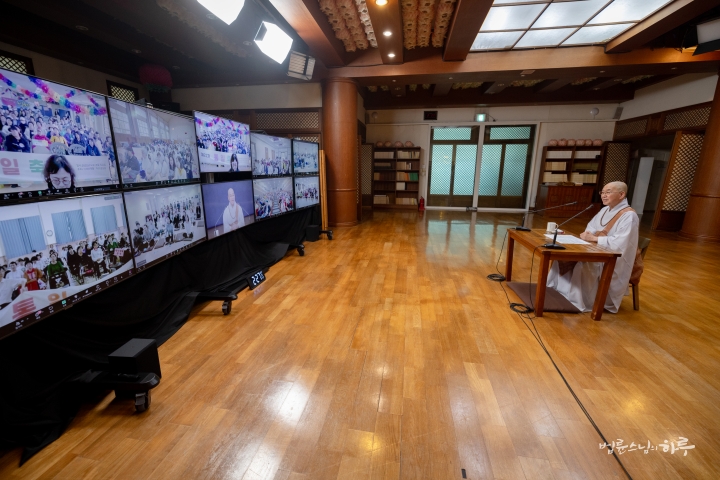
What Mindset Should Those Who Witness Others’ Final Moments Have?
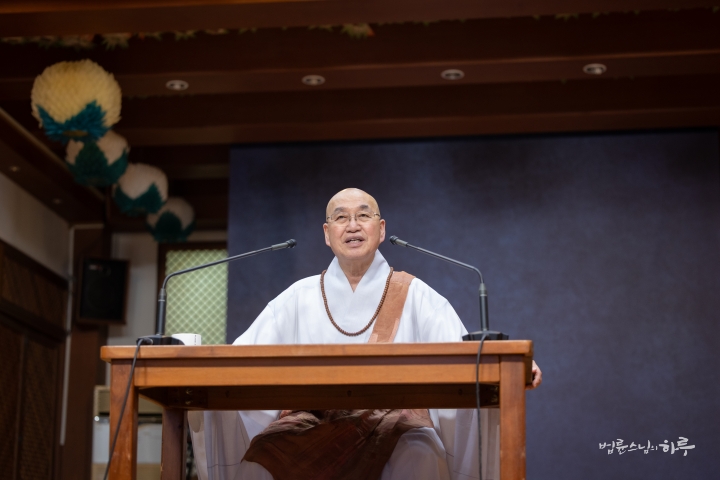
“Elderly people need care because they have difficulty moving around. And when you work caring for the elderly, you inevitably face the passing of those you’ve been with frequently. This is sad but a natural part of life. ‘I wish they wouldn’t pass away’ is merely the caregiver’s wish, but death is a natural phenomenon that no one can prevent. So first, it’s good to have the mindset of ‘I hope they can live comfortably until they pass away.’ Rather than being too sad about their passing or trying to hold on, view it with the hope that they remain peaceful until their final moment.
Second, when dealing with elderly people, an attitude of accommodating their wishes rather than making demands is necessary. As we age, not only do our bodies stiffen, but our thoughts and minds also become less flexible. That’s why we often say someone has ‘become stubborn.’ When parents don’t listen well to their children, it’s not intentional but because their thinking doesn’t change easily. Therefore, when an elderly person makes a request, it’s good to accommodate their wishes as much as possible. Rather than demanding ‘Please do it this way,’ respond with respect saying ‘Yes, I understand.’ Of course, you can’t fulfill every request. In such cases, you can politely say, ‘I’m sorry, but this is difficult for me to do.’ Do what you can willingly, and politely decline what you cannot do – this is the most appropriate attitude.
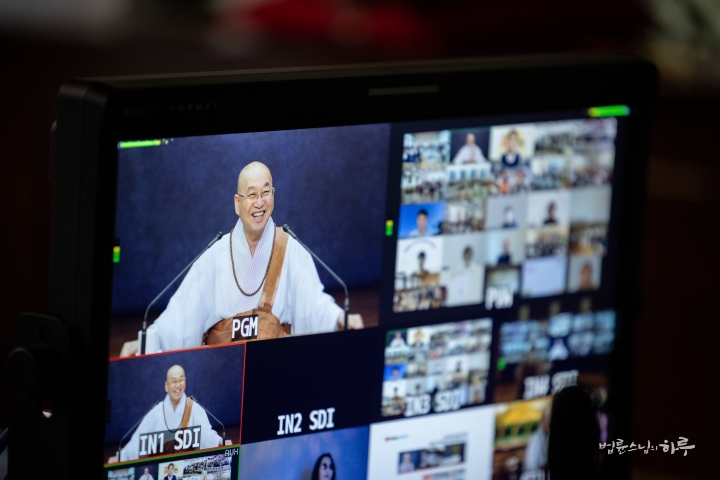
When caring for the elderly, encountering death frequently is an unavoidable part of daily life. In contrast, those who care for young children rarely experience such events. So rather than thinking ‘I’m troubled by frequent deaths,’ if you approach it with the mindset of ‘I should help this person be comfortable until the very end,’ the work becomes much lighter.
Elderly people have rigid bodies and minds that don’t change easily. That’s why it’s much wiser for me to adapt to them. If you try to fulfill all their wishes, your heart will become exhausted. When you need to refuse, instead of saying ‘I can’t do that!’ it’s better to say gently, ‘I’m sorry, elder. This is difficult for me to do.’ If you work with this mindset, caring for the elderly becomes not a burden but a path of warm and light caregiving.”
“I understand well. Thank you.”
“I’m grateful for your heart in caring for the elderly. Seeing that you’re already worried about me needing care, I must have gotten quite old.” (laughter)
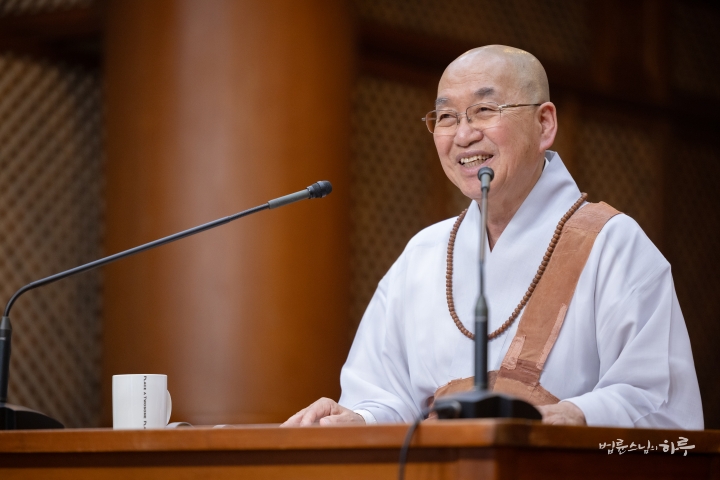
After finishing the Dharma Q&A, the talent show continued. There was someone who touched the audience’s hearts by singing ‘Hateful Love’ with heartfelt emotion, someone who expressed feelings of love and longing by playing Teresa Teng’s famous song ‘The Moon Represents My Heart’ on the saxophone, someone who added vitality by performing a powerful dance to the girl group aespa’s ‘Whiplash,’ someone who evoked warm emotions by singing ‘Wild Rose’ filled with old memories, someone who sang the North Korean song ‘Please Forgive’ expressing longing for mother and teacher, someone who expressed homesickness by singing ‘Flower Road,’ and someone who presented sweet melodies by playing a farewell song on the special instrument, the aerophone. All performances contained heartfelt feelings for their homeland and earnest wishes for peace and unification.
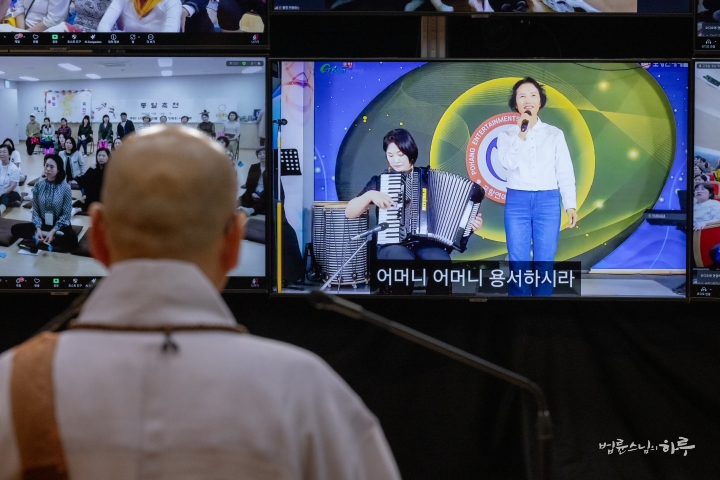
Leaving the excitement behind, Sunim finally delivered closing remarks while sharing news about the homeland that North Korean defectors desperately miss.
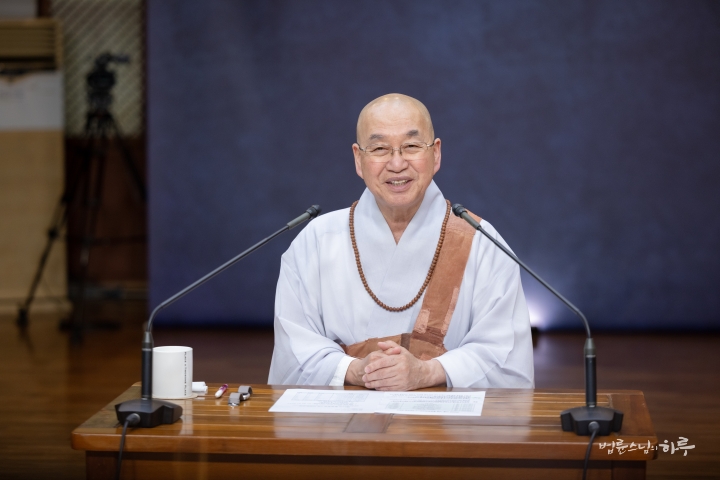
“It seems you’ll have to wait a little longer for the news from home and visits to your homeland that you’re so desperately waiting for. Since North Korea has currently suspended all dialogue with South Korea, it’s realistically difficult at the moment. However, ahead of this APEC summit, I’ve made several proposals in preparation for the possibility of a surprise dialogue between North Korea and the United States. One of them is allowing American tourism to North Korea’s Wonsan tourist zone. North Korea has developed an excellent tourist complex in Wonsan, but they’re struggling due to the lack of foreign visitors. Another proposal is creating a memorial space for Korean Americans from North Korea. Even if they can’t return home while alive, this would allow them to be buried in their homeland after death by creating a tree burial memorial facility near Pyongyang. This would create opportunities for their descendants to visit North Korea to honor their ancestors while also touring North Korea. Currently, North Korea reportedly has excavated and preserved many remains of American soldiers who died during the Korean War. If the process of repatriating some of these remains to the United States could restart light dialogue between North Korea and the US, it would greatly help ease the war crisis on the Korean Peninsula.
Though the Door Between North and South Is Closed, the Path to Dialogue Will Open Again
It has already been 72 years since the armistice agreement was signed. We are still in a state of war. Now is the time for a peace treaty. If that happens, the danger of war on the Korean Peninsula will disappear, and a more stable and peaceful relationship between North and South can continue.
Let me share some news from North Korea. Recently, North Korea has reportedly begun wheat farming in earnest. While they mainly cultivated corn before, test cultivation of barley and wheat in some areas showed increased production. In North Korea’s reality of fertilizer shortage, wheat, which requires relatively less fertilizer than corn which needs a lot of fertilizer, seems to have had higher production efficiency. So the situation has improved somewhat compared to what was feared.
Currently, North Korea has completely suspended dialogue with South Korea and is not receiving any support from South Korea. As a result, my work helping North Korean residents has also stopped for now. However, in my opinion, there’s a possibility that exchanges between North and South will resume soon. I will continue to work hard so that you can visit your hometown as soon as possible. Even if unification doesn’t happen immediately, if we can travel back and forth to our hometowns, meet family, and exchange news, that alone would be significant. So let’s move forward together toward that day without losing hope.
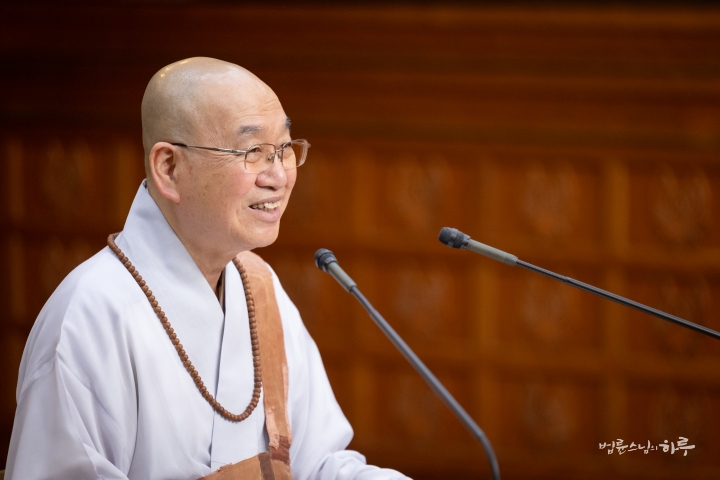
Although the current inter-Korean relations may seem severed and make you feel anxious, looking back at the 70-year history of division shows us a pattern. One day it seems like war might break out, the next day reunification appears imminent, then tensions rise again only to ease once more – this cycle has repeated itself continuously. So I hope you can let go of both excessive expectations and disappointments. Even when the situation appears as tense as it does now, it will soon ease, and conversely, when reunification seems within reach, difficulties may arise again. Issues on the Korean Peninsula have always fluctuated in this way. My prediction is that dialogue between the United States and North Korea will resume around the end of this year or the first half of next year. Inter-Korean relations are also likely to improve after that.
There was a time when North Korea seemed so isolated that we wondered if it might collapse, but the situation has changed somewhat now. North Korea has strengthened its security foundation through military cooperation with Russia, and recently its relationship with China has been gradually improving. Economic exchanges with China are expected to resume soon, and there are reports that Chinese e-commerce companies are preparing to enter North Korea. While change may appear slow on the surface, North Korea is actually taking cautious steps to join the international community in line with global trends. Though not yet clearly visible from the outside, signs of change are definitely emerging here and there internally. So please don’t worry too much.
More important than visiting your hometown is creating an environment where we can freely exchange news with each other. While phone calls and sending items are currently possible through unofficial channels, the high costs make it difficult. If such exchanges could be conducted legally and stably, the path to hometown visits would open much faster. So please don’t lose hope, and focus on settling well in South Korea while building your strength. For now, it would be good to set aside some worries and gradually prepare for the day when you can contact your hometown and offer help. Above all, living happily and well here yourselves will be the greatest source of strength for your hometown and families. I’ll see you again during kimchi-making season. We’ll arrange another meaningful gathering like this next year. It was truly wonderful to meet you all today.”
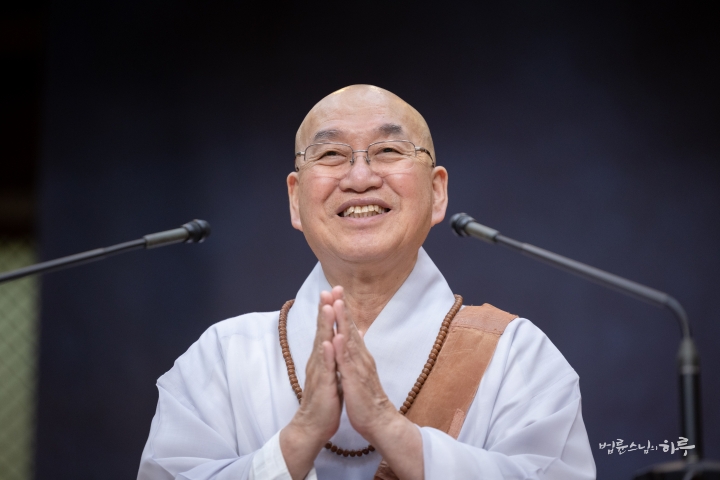
As the event concluded, an awards ceremony for the talent show was held. The popularity award, encouragement award, excellence award, and grand prize were announced in order, and participants congratulated each other with enthusiastic applause.
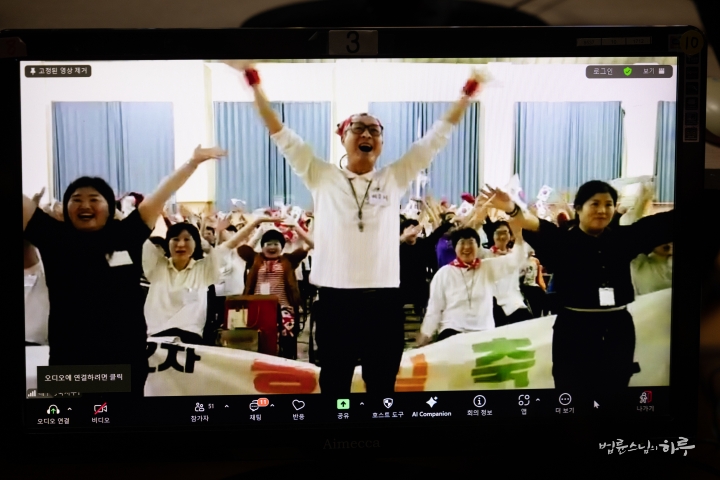
The grand prize went to the Tongsta team from the Hwaseong region, who performed hopeful choreography to the song “Let’s Unify.” The online unification festival concluded with another viewing of the Tongsta team’s performance. Participants from across the nation, both online and offline, were able to share their stories and sing of hope for unification with united hearts.
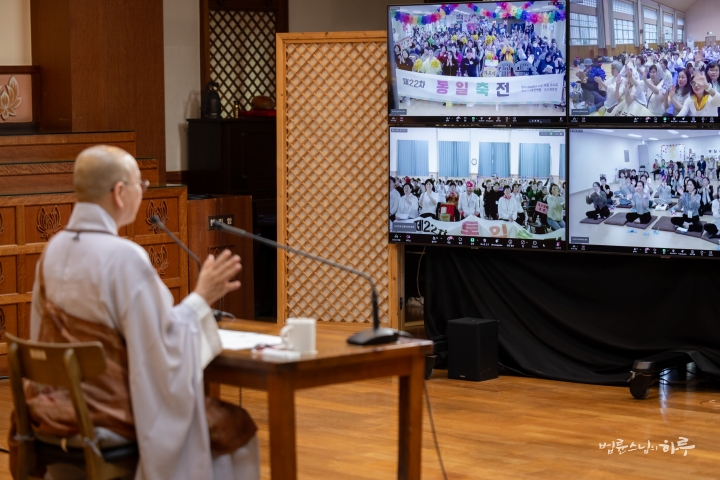
Subsequently, at 5 PM, an online Dharma Q&A session for healthcare professionals began. About 200 members affiliated with the Healthcare Professionals’ Jungto Society entered the video conference room.
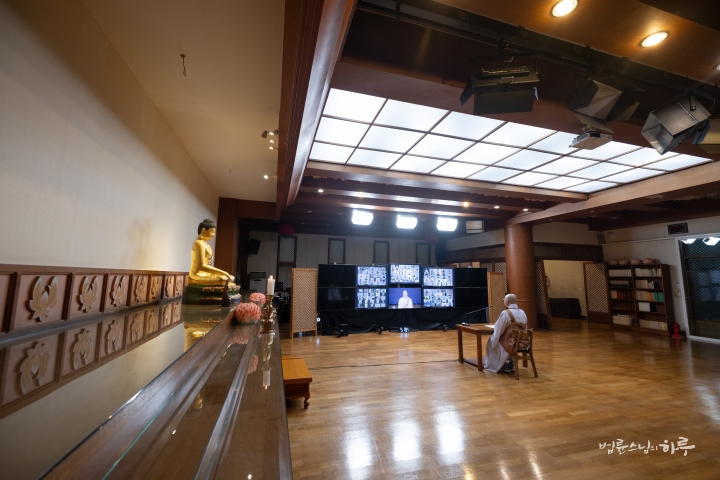
Since its founding, the Healthcare Professionals’ Jungto Society has consistently held annual Dharma Q&A sessions with Sunim. A video showcased the journey of the Healthcare Professionals’ Jungto Society over the years. The video highlighted their medical volunteer work in Mindanao, Philippines, weekly free medical services for marginalized communities at JTS multicultural centers in Ansan, Ilsan, and Busan every Sunday, and medical support provided at various Jungto Society events.
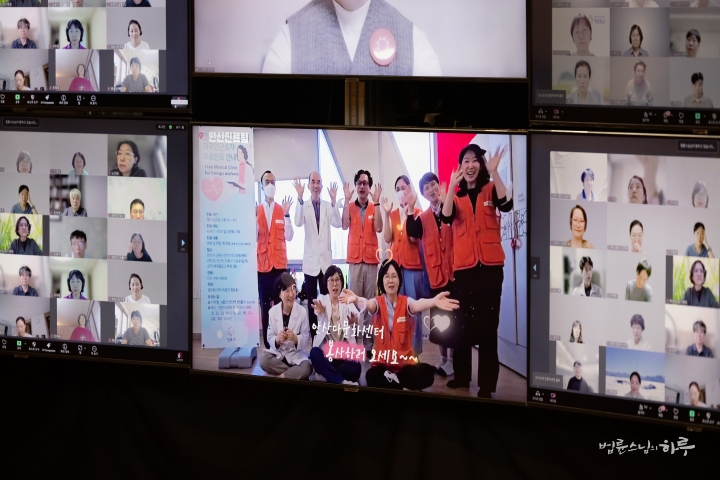
Sunim then expressed his gratitude for the Healthcare Professionals’ Jungto Society’s hard work and began the dialogue by discussing future challenges for the organization.
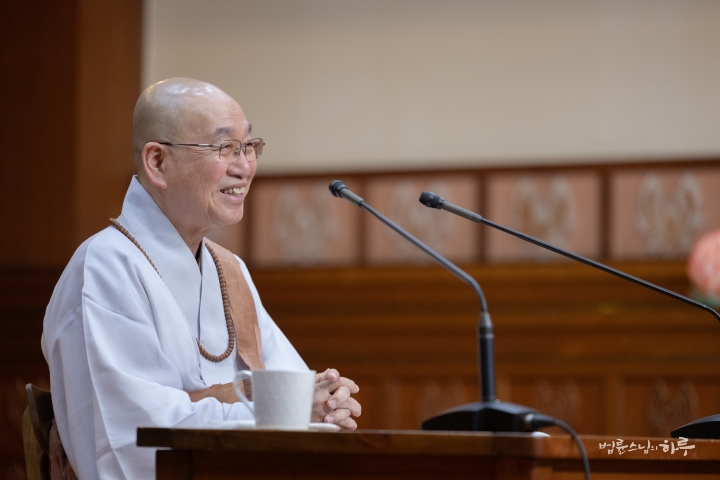
“Medical blind spots still exist in many parts of the world. In other words, there are many people who do not receive adequate medical care. In his final teachings, the Buddha emphasized the merit of offerings and mentioned two things. First is giving food to the hungry, and second is treating the sick. Medical support is indeed a precious service.
Currently, JTS is actively providing food aid to the hungry and is pursuing large-scale school construction projects for children. However, when visiting impoverished areas recently, while food, clothing, and schools are certainly important, what is even more desperately needed is medical support for treatment when people fall ill.
However, due to the relative shortage of medical professionals in reality, the medical support sector of JTS projects has been somewhat inadequate. Under these circumstances, you have provided medical volunteer services at the JTS project site in Mindanao, Philippines, and are planning medical activities in Dungeshwari village, where Sujata Academy in India is located. Additionally, in Bhutan, as part of sustainable development, projects such as eye surgery, hearing aids, and denture support for the elderly are being promoted, with denture support already in the survey stage for implementation. I am truly grateful that these activities are gradually expanding with the Healthcare Professionals’ Jungto Society at the center.
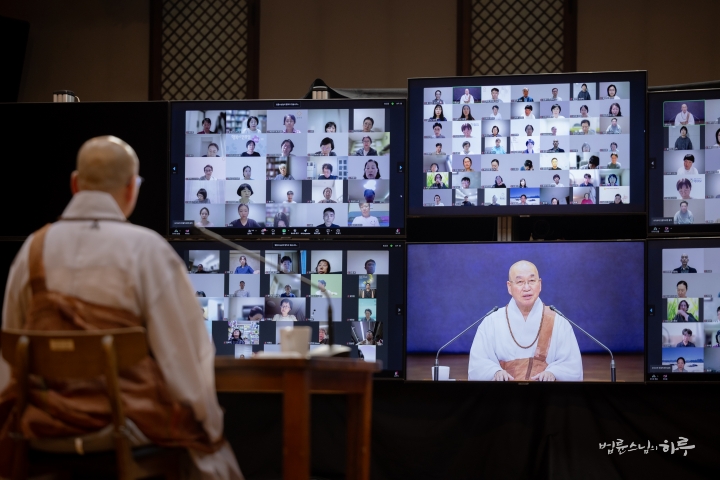
The Pain of Not Being Able to Receive Treatment When Sick Is Harder Than Poverty
I believe there is one task that Jungto Society must address in order to carry out these activities more systematically. That is for Jungto Society to have its own medical institution, namely a general hospital. Even if it’s not large in scale, having our own hospital would allow us to conduct medical volunteer activities much more efficiently and systematically.
Currently, many of you medical professionals run private practices or work at large hospitals, making it difficult to find time to participate in overseas volunteer work. However, if we had our own hospital, it could serve as a base for medical supply support and volunteer activities, allowing medical professionals to participate more efficiently. Especially in today’s era where everything is connected online, it would be beneficial to establish a system within the Medical Professionals’ Jungto Society where we create networks by specialty—such as ophthalmology, dentistry, and internal medicine—to support medical care. If such a foundation were established, overseas medical volunteer work would also become much easier. Therefore, it is necessary to develop concrete long-term plans for establishing a hospital.
Once this foundation is in place, support for medically underserved areas will become even more important in the future. For example, in the case of North Korea, while food and living conditions are difficult, medical support is actually the most urgent need. Although they recently built a 1,000-bed hospital in Pyongyang, it reportedly lacks proper internal facilities. Most of it is filled with used medical equipment imported from China, and they lack even basic medical supplies and consumables like disinfectants and gauze. If inter-Korean relations improve and North Korea becomes willing to accept relief supplies, we plan to pursue agreements to fully support such basic medicines and consumables, even if not large medical equipment.
The small clinics currently operating in India also remain at the level of health centers due to the absence of resident medical professionals. Since medical professionals typically earn higher incomes than other professions, not many are willing to retire at 65 and volunteer for the next 10 years. Rather, many continue working until they’re 70 or 80, making it difficult to secure volunteers. That’s why I hope you will adopt the value of working for your family and livelihood until a certain point in your life, and then dedicating 10 years after age 65 to serving the world and those in need. Even if you cannot volunteer for your entire life, it’s important to carry on that spirit.
To realize this, we need to establish our own medical infrastructure domestically, even if small. Only then can overseas medical volunteer work proceed smoothly. Especially in regions like Southeast Asia that have reached a certain economic level, medical support is the most urgent need rather than food or supplies. While we have mainly focused on food, supplies, and school support, we must now recognize that medical support is what the local residents need most. I hope you will embrace this mission and vision and participate actively.
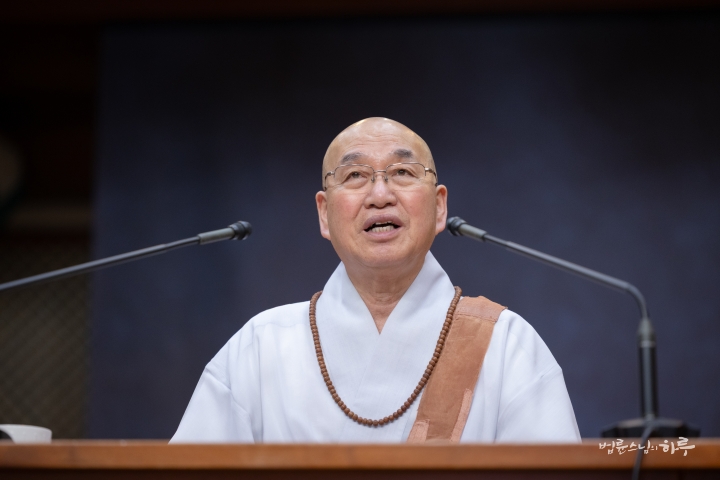
The first goal of the Medical Professionals’ Jungto Society is to cultivate one’s mind through practice and to care well for patients experiencing mental difficulties in their own hospitals. The second goal is to make time to contribute to society, particularly by helping those in medical blind spots. Furthermore, we hope to support medical blind spots around the world. For example, in the case of Syria, the biggest requests we receive are to build or remodel hospitals and to provide necessary equipment or medicine. However, JTS currently lacks basic capabilities in the medical field, making it difficult to adequately respond to such requests. That’s why I hope your expertise can be utilized in the future, even if not immediately.”
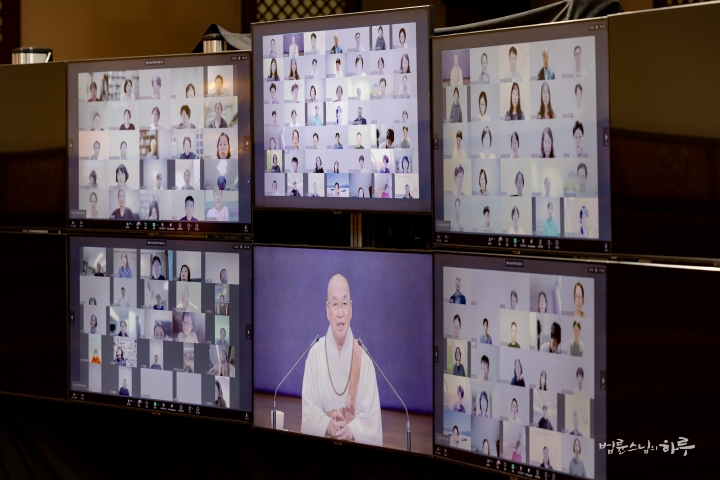
While urging medical professionals to volunteer more frequently, Sunim took questions from participants. During the two-hour session, five people pressed the hand-raising button and had conversations with Sunim. One of them sought Sunim’s advice on how to manage the conflict between genuinely caring for patients and feeling frustrated due to annoyance and unfair workload distribution.
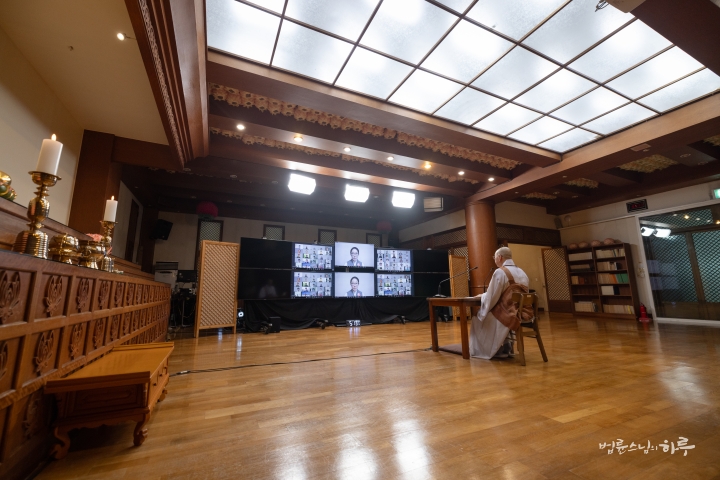
As a Doctor, I Want to Help Patients, but Feel Annoyed When Work Increases
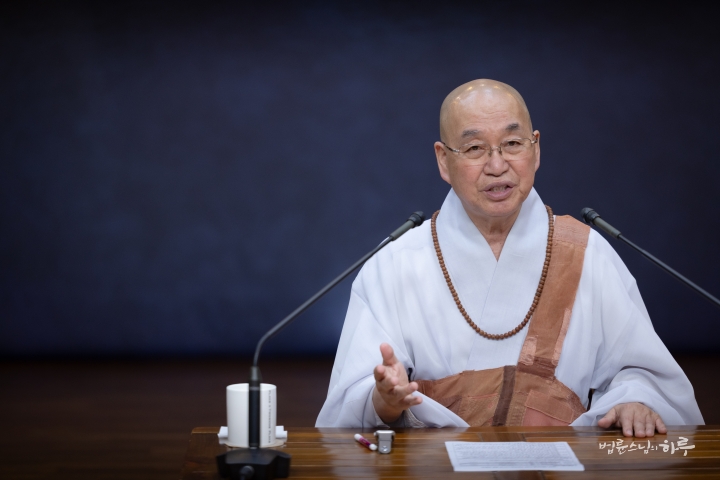
“To become a good doctor, should you have more clinical experience or less?”
“You should have more.”
“Then should you be assigned more patients or fewer?”
“You should be assigned more.”
“While it’s understandable to complain about not being assigned enough patients, complaining about having too many patients is like giving up on becoming a good doctor yourself.
At the Sujata Academy operated by JTS in India, there are local doctors called ‘Village Doctors.’ In India, if someone works as an assistant under a doctor for about a year, even without graduating from a formal medical school, they can receive ‘Village Doctor’ qualifications to sell medicine or provide simple treatments in the village, as long as the doctor signs a statement saying ‘This person worked as my assistant for one year.’ This system emerged due to the absolute shortage of doctors.
The doctor at our Sujata Academy is also such a Village Doctor, but surprisingly, his trauma treatment skills surpass those of Korean doctors. The reason is that he has accumulated extensive clinical experience by treating dozens of patients daily. By continuously treating various patients – those bitten by scorpions or snakes, patients with broken legs, patients with boils, and so on – he has developed very high responsiveness in actual field situations.
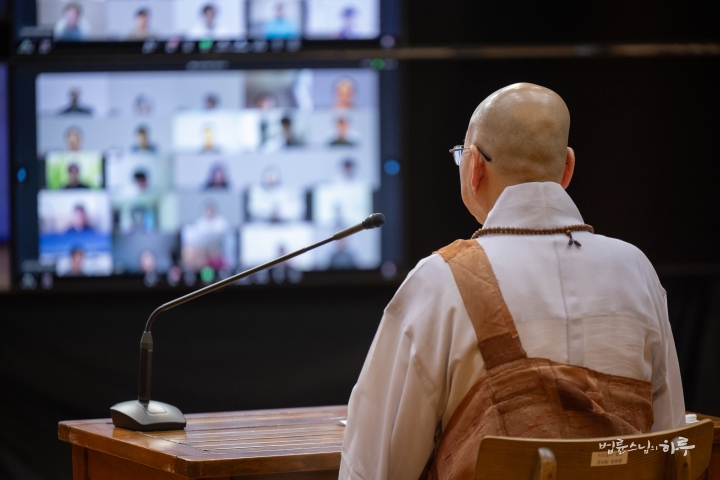
Of course, there are cases where Indian doctors prescribe antibiotics excessively, which sometimes surprises Korean doctors. While this is certainly not desirable, it does produce quick results in the short term. This is precisely why when you catch a cold in India and receive a prescription from an Indian doctor, you recover quickly. In contrast, prescriptions from Korean doctors are relatively mild, so the effects appear more slowly. This phenomenon is also related to the reality in India. Since most patients are poor, they won’t return to the hospital if they don’t feel their symptoms improving quickly after taking medicine. Therefore, Indian doctors have no choice but to opt for ‘strong prescriptions’ that can improve patients’ symptoms in a short period.
Even with limited knowledge, if you have extensive clinical experience, you can treat illnesses effectively. This is especially true for traditional Korean medicine doctors, whose skills improve as they accumulate clinical experience. While technical skills might be more important in fields that rely on machines for diagnosis and treatment, traditional Korean medicine requires practitioners to directly examine patients’ pulses and perform acupuncture, carefully observing the patient’s condition. For this reason, abundant clinical experience is absolutely essential.
Therefore, if you want to become an excellent traditional Korean medicine doctor, it’s important to gain as much clinical experience as possible. You need to have an attitude of wanting to learn, even if it means taking clinical opportunities from other doctors. However, if you’re complaining that ‘I have too many patients’ compared to other doctors, your perspective is already misguided. Even if you work overtime or treat patients so busily that you don’t have time to eat, if you maintain the perspective that ‘having more clinical experience is a precious opportunity given to me,’ then no difficulty will be a problem.
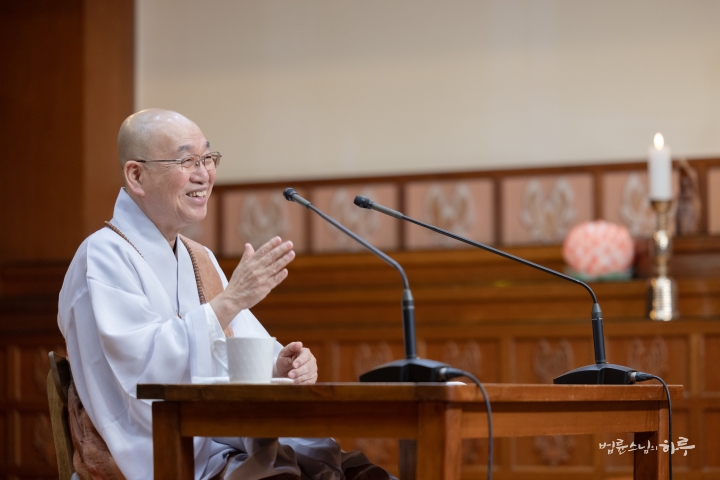
Of course, nowadays, unlike in the past, medical records must be kept for every patient consultation. As clinical opportunities increase, so does the administrative work that needs to be documented. This can make the work feel more challenging. Among teachers, there are those who say, ‘I wish I could just teach children, but there’s so much administrative work that it’s difficult.’ However, teaching and administration are inseparable. The same applies to doctors. Even if you say, ‘I just want to treat patients,’ medical records and prescriptions must ultimately be recorded by the doctor directly. This is because it is the doctor’s duty.
Rather than finding such tasks bothersome, it’s better to accept that recording the results after treating patients and prescribing according to their symptoms are all part of a doctor’s role. For traditional Korean medicine doctors especially, clinical experience directly translates to competence. So instead of finding it troublesome to see many patients, if you accept it joyfully and gratefully to accumulate more clinical experience, you can become an even better traditional Korean medicine doctor.”
“Yes, thank you. After listening to your words, Sunim, I feel somewhat ashamed. I will work hard to gain more experience and become an excellent traditional Korean medicine doctor in the future. Thank you.”
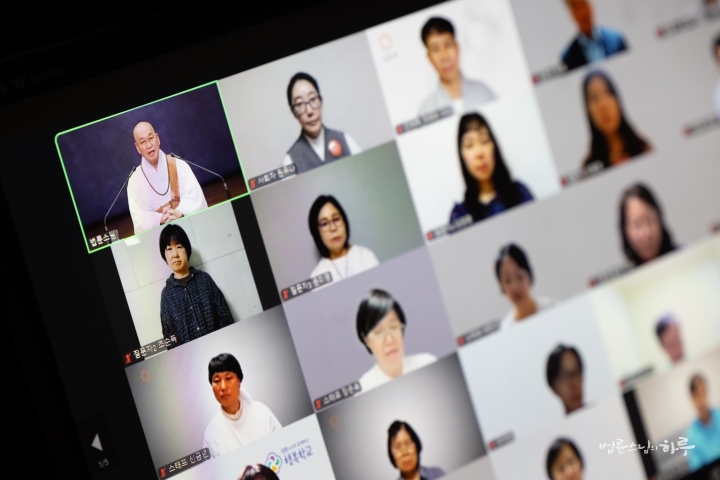
Questions continued to follow.
When I try to explain things thoroughly to patients, consultation times often run late. Should I prioritize patient understanding or keep to scheduled times?
I try to understand foreign patients, but I get angry at their rule-breaking and selfish attitudes. How should I view and manage these emotions?
I’m about to retire after 36 years of public service. How should I organize and prepare for my future life?
How can I provide comfort and strength to patients who fear death without relying on religious faith?
It was a time to gain proper perspective on what viewpoint healthcare workers should have when providing service. After finishing the dialogue, it was 7 PM. The live broadcast ended with a promise to meet again at the next lecture.
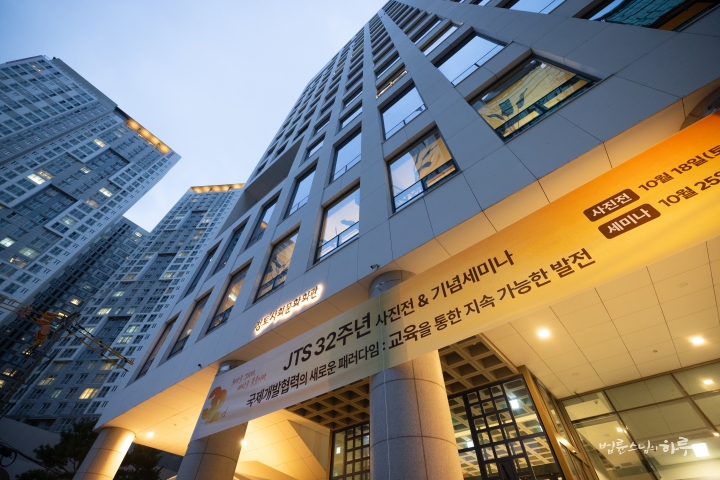
After sunset, Sunim spent the evening proofreading manuscripts and handling various tasks before concluding the day’s activities.
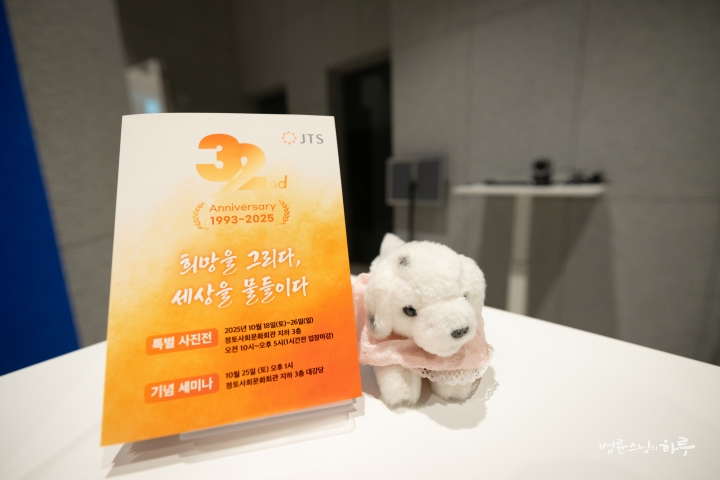
Tomorrow morning, Sunim will have a meeting with the Jungto Society Standing 1000-Day Preparatory Committee, then give a Dharma Q&A for multicultural families. In the afternoon, he will attend a supporters’ workshop preparing for the Youth Festa event, and in the evening, he will travel to Dubuk Jungto Retreat Center.





